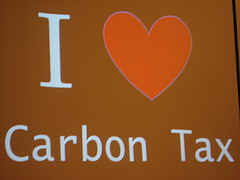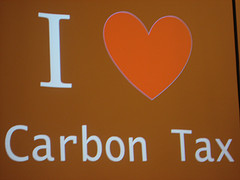 With unemployment remaining above 9 percent, Congress and the president continue to be locked in a stalemate over increasing the debt ceiling so that our country can pay its bills.
With unemployment remaining above 9 percent, Congress and the president continue to be locked in a stalemate over increasing the debt ceiling so that our country can pay its bills.
Those on the far right are focused on using this crisis as an opportunity to fundamentally remake the role of government. They propose eviscerating vital programs such as Medicare, unemployment insurance, and environmental protection. Last year, the White House laid the groundwork for this attack by agreeing to an extension of the Bush tax cuts, freezing the pay of government workers, calling for a streamlining of regulation, and supporting many painful cuts. With millions of Americans out of work, we cannot afford to see these essential government functions eliminated, and we don’t have to.
An innovative new source of revenue would reconfigure this debate if it received the attention it merits. As Matt Yglesias noted Tuesday, instead of slashing spending and giving polluters license to destroy the environment and endanger public health, we could solve our budget challenge merely by getting polluters to pay for the costs their pollution imposes on society.
A progressive solution to our budget woes: the carbon tax
Because of the rightward, pro-corporate character of the current debate, few ideas about how to generate new revenue are being discussed. A carbon tax ought to be.
Simply, a carbon tax is a fee assessed on substantial emissions of climate-destabilizing gases. It can be levied on pollution from coal, natural gas, and gasoline, as well as other sources of heat-trapping gases, and in addition to offering a potential solution to our budget problems, it can play an important role in protecting the public from the harmful impacts of climate change.
There are many ways a carbon tax can be structured. One example was provided in the carbon tax bill proposed by Rep. Pete Stark (D-Calif.) in 2009, which would have taxed carbon dioxide emissions from coal, oil, and natural gas at an initial rate of $15 per ton, with the tax increasing in each successive year. The bill would have generated about $80 billion in the first year after its enactment, and created $600 billion in new revenues over 10 years. Other forms of a carbon tax could raise substantially more revenue.
To get a better sense of just how much $600 billion is, let’s compare it to aspects of the proposal put forward by the Gang of Six [PDF], the bipartisan group of legislators playing a prominent role in budget negotiations. $600 billion is more than the cuts to Medicare proposed by the Gang of Six ($298 billion over the next decade). It’s also more than the $108 billion that the Gang of Six would obtain by skimping on Social Security cost of living increases over 10 years, a proposal that the National Women’s Law Center [PDF] says would particularly hurt elderly women. In addition, it’s far larger than the $70 billion in health, education, labor, and pensions funding that would be slashed by the Gang of Six.
In other words, a carbon tax could also be used to pay for environmental programs that are on the chopping block. In February, the House voted to chop $1.4 billion from the Clean Water State Revolving Fund, a 67 percent decrease. This program provides critical support for wastewater infrastructure, which prevents sewage from getting into our rivers, food, and drinking water. The current House Interior Appropriations bill would reduce the EPA’s budget by 18 percent, the Land and Water Conservation Fund by 80 percent, and the Fish and Wildlife Service by 21 percent. Instead of giving polluters a free ride because we are not raising money for environmental enforcement, we should make polluters bear the costs of their pollution.
Fundamental fairness
The debate over our national budget is fundamentally a debate over our collective priorities, the role of government, and our shared values. As polls show, a majority of the public believes that the budget should not be balanced on the backs of the poor and the elderly, and that wealthy corporations and individuals must do their share. These fundamental notions of fairness and caring for others are core American values, and a carbon tax advances them.
The impacts of a poorly structured carbon tax could fall disproportionally on lower-income Americans. But there are ways to structure it so it raises revenue while protecting them. From the perspective of fairness, given a choice a between imposing a carbon tax or cutting programs like Medicare, Medicaid, and Social Security, a carbon tax is a no-brainer.
The double dividend
Not only could a carbon tax help solve our budget mess, but, as noted above, it could also create enormous environmental benefits. This creates a “double dividend.”
A carbon tax implements the common-sense “polluter pays” principle — making polluters pay for the costs their pollution creates for society, rather than shifting these costs onto the rest of us. When a company emits greenhouse gases, we all pay the price in terms of climate change impacts. Think of the lives and property lost in extreme weather events like droughts, floods, wildfires, hurricanes, and tornadoes. Think of the productivity decline when an airport or highway must shut down due to a blizzard. Think of the long lines in hospital emergency rooms every time there is a summer heat wave. As scientists around the world have warned, climate change has increased, and will continue to increase, the severity and frequency of extreme weather events. In fact, in the first six months of 2011, the United States experienced a record eight extreme weather events, costing $1 billion or more.
All these impacts are examples of what’s called the “social price of carbon.” The Stockholm Environment Institute recently estimated this cost in monetary terms: Every ton of carbon dioxide released into the atmosphere can cause up to $893 in economic damage. One of the great advantages of a carbon tax is not only that it would raise revenue, but that it would make markets fairer and provide corporate polluters an incentive to redu
ce their pollution. And less pollution would mean fewer costs for all of us (including less pressure on the federal budget, through reduced health care, pollution cleanup, and other costs).
The Carbon Tax Center estimates that by taxing fossil fuels (which account for the vast majority of U.S. greenhouse-gas emissions) at an initial rate of $12.50 per ton, and increasing the tax each year, we could bring down greenhouse-gas emissions by 40 percent by 2025. This is because increasing carbon prices will cause companies and consumers to bring new, cleaner technologies to market, and to switch to using products that are less carbon intensive than their predecessors.
Many countries have adopted carbon taxes. Sweden, Denmark, Finland, the Netherlands, and the United Kingdom are a few. So too have Canadian provinces like Quebec and British Columbia. In the United States, the city of Boulder, Colo. adopted a carbon tax on electricity that is equivalent to $12-13 per ton, and in 2008 the San Francisco Bay Area Air Quality Management District instituted a micro tax of 4.4 cents per ton. The revenues from these carbon taxes [PDF] were used in a variey of ways, from climate mitigation programs (Boulder, Quebec) to funding the general treasury (Norway, Sweden) to offsetting other taxes (United Kingdom, British Columbia).Any of those uses could make sense in the U.S., as could using the revenues to reduce the budget deficit — the Tea Party leaders’ stated rationale for the draconian spending cuts they are demanding.
The politics of a carbon tax
Unfortunately, even though it is an eminently sensible policy solution, a carbon tax is not currently part of mainstream American political debate. This challenge won’t be remedied quickly, but changing our politics so it can accommodate such a sensible solution should be a long-run priority.
Probably the key reason a carbon tax has not seriously entered into the current debate about whether and how the federal debt limit should be raised is that it is a form of revenue increase, and many of the Tea Party-aligned first-year Republican representatives in the House have taken a rigidly ideological stance of vowing to block any sort of revenue increase whatsoever — including proposals to end direct subsidies to highly profitable oil companies or end tax loopholes for corporate jets.
The Republican framing of our budget problem as merely a “spending” problem is incredibly misleading. Corporate income taxes contribute only a measly 7 percent of our federal budget receipts, and the Bush tax cuts account for almost 40 percent of our debt burden (projected for 2019, assuming we continue extending them). Moreover, according to the Center for American Progress, “The government now spends $1.2 trillion annually on tax expenditures — more than half as much as it raises ($2.2 trillion) through the tax code.” There is simply no logical way to ignore the revenue side of the equation. Of course, as we all know, political rhetoric often defies logic, and the Republicans’ successful push to focus the current debate on spending cuts has resulted in the exclusion of revenue-focused proposals such as a carbon tax.
In addition, a majority of House Republicans, and many Republican presidential candidates, now deny the fact that climate change is occurring, that it is a severe threat, or that it is largely caused by human activity. This would make it hard for them to support a policy that has a reduction in carbon pollution as one of its chief aims. And other politicians who believe the science but see climate change as too contentious a political issue may be tempted to ignore proposals like a carbon tax that address the substantial threats to our climate head-on. Joseph Romm recently graded the president an “F” on energy and the environment for “failing to defend climate science from the disinformation campaign.” It’s hard to see the current President Obama advocating for a carbon tax proposal.
While these hurdles are significant, if we are really going to deal with our deficit problems and the climate crisis, one day we are going to need to look at bold solutions. As recent surveys show, the American public is strongly dissatisfied with how Congress is handling the budget crisis and business as usual in Washington, and most Americans want revenue increases to be considered. Moreover, when the choice is framed as being between cutting the social safety net and making polluters pay for their pollution, it no longer seems bold at all. It’s long past time to make polluters pay their way as we deal with our national debt.



